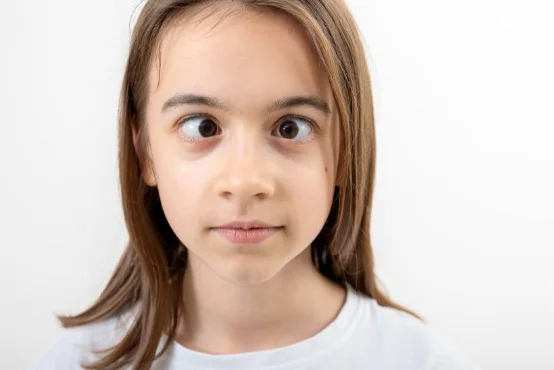If you are planning for Squint Surgery in Delhi then you are at the right place. You can get skilled and experienced eye surgeons who provide treatments and perform these surgeries. By adjusting the eye muscles or tissues, squint operation helps people see better, work together and feel more confident.
 Let’s know about what is squint?
Let’s know about what is squint?
Squint, medically known as strabismus, is a condition where the eyes are misaligned i.e. pointing in different directions. This problem does not only affects the appearance but also leads to vision problems like loss of Binocular vision.
Symptoms and signs of a squint or strabismus may vary depending on the individual and the type of squint. Here are some common signs and symptoms you may feel in this eye problem:

1. Misaligned eyes: One eye can move inwards, forwards, up, or down, but the other eye stays straight. You may also get blurred vision due to this misalignment.
2. When you have double vision, you may see two pictures of the same thing at the same time.
3. Eye strain means having trouble focusing, especially when reading or looking at things up close.
4. Headaches: These are often caused by eye strain, and kids who squint may get them more often.
5. Eye Fatigue: Your eyes may feel tired or achy, especially if you use them for a long time.
6. Depth Perception Problems: Not being able to accurately judge distances.
7. Abnormal Head Position: To fix their squint, some people may tilt or turn their head.
8. Problems with Eye Movements: It's harder to move the eyes together easily.
The causes of a squint, also known as strabismus, can vary and may involve problems with the eye muscles, nerves, or brain. Some common causes include:
1. Imbalanced Muscles: One eye may turn in a different way than the other if the muscles that move the eyes are not balanced.
2. Refractive Errors: Nearsightedness (myopia), farsightedness (hyperopia), or astigmatism can make you squint, especially if your prescription for one eye is very different from your prescription for the other.
3. Development in Childhood: Squinting can sometimes start in early childhood or as a baby because of issues with eye movement or the way the visual system develops.
4. Genetics: Some people are more likely to squint than others, and having a family history of the condition makes it more likely that you will also develop it.
5. Eye Injuries or Diseases: Squinting can be caused by injuries to the eye, infections, or eye diseases like cataracts or retinopathy of prematurity (ROP).
6. Neurological Conditions: Some neurological conditions, like cerebral palsy or Down syndrome, can affect the nerves and muscles that move the eyes, which can cause people to squint.
7. Amblyopia, also known as "lazy eye," is a condition in which one eye has poor vision because of problems with how it developed while the person was a child. Squinting can sometimes be linked to this condition.
This can be in different types:

1. Esotropia: One eye turns inward towards the nose.
2. Exotropia: One eye turns outward away from the nose.
3. Hypertropia: One eye turns upward while the other stays straight.
4. Hypotropia: One eye turns downward while the other remains straight.
These types of squints can vary in severity and may require different treatments to help align the eyes properly.
In Delhi, you can get the following treatment options for Squint:
1. Glasses: Corrective lenses can sometimes help straighten the eyes by correcting refractive errors.
2. Eye Exercises: Certain exercises can improve eye coordination and muscle control. Like Vision Therapy.
3. Prism Lenses: These special lenses can help align the eyes optically.
4. Surgery: Surgical correction may be necessary to adjust eye muscles and align the eyes properly. The types of squint surgery may include the below:
5. Botulinum Toxin Injections: In some cases, injections can temporarily weaken overactive eye muscles, improving alignment.
Each type of treatment aims at aligning the eyes properly and improve vision. The specific procedure recommended depends on factors like the type and severity of the squint. It's important to consult with an experienced eye surgeon to determine the best approach for your individual needs.
At Save Sight Centre, you can get patient-centric methods to get your eyes in proper alignment and improved vision. We had taken care of more than 1,40,000+ patients in past 13 years. You can get all eye care services under one roof at a reasonable cost with many payment methods. We have Pediatric Ophthalmologist and vision therapy as well. As squint can exist in kids as well adults as well, we treat everyone in a unique manner as per the eye conditions.

With advances in surgical techniques and personalized care, patients can achieve excellent outcomes and regain their confidence in no time. If you or a loved one is struggling with a squint, consult with an experienced ophthalmic surgeon to explore your treatment options and take the first step toward a brighter, clearer future.
Ans: The cost of squint eye surgery in Delhi typically starts from ₹20,000 (excluding anaesthesia charges). However the actual cost will be finalized after the surgeon check-ups the patient and advices.
Ans: This eye surgery is highly successful, but results can vary. Success rates are generally high with proper follow-up care.
Ans: The best age for squint surgery is usually in early childhood, around 3-6 years old, but it can be done at any age if needed.
Ans: Yes, squint can often be cured permanently with surgery, although some cases may require additional treatments or follow-up.
Copyright © 2025 | Save Sight Centre | All Rights Reserved.